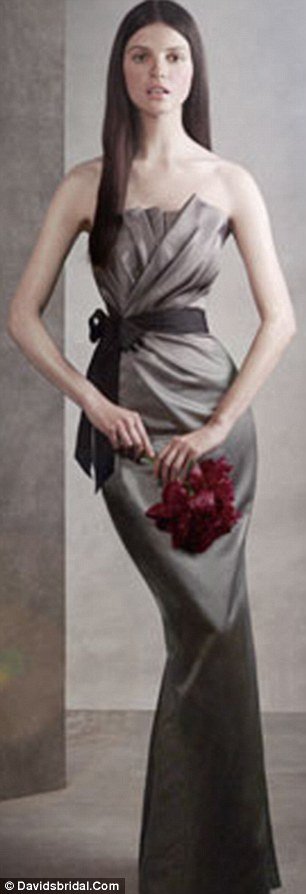A Vera Wang model’s waist appears to have been airbrushed to an impossibly tiny size, making it almost narrower than the width of her head.
The model, who wore a White by Vera Wang bridesmaid gown, and appeared on the David’s Bridal website, had a slender, yet normally proportioned waist in a back view.
The front shot, however, saw the model’s midriff whittled down to what seems to be almost half its actual size.
Even more ridiculously, the $168 gown, is magically transformed from the charcoal-colored design seen from the front to an entirely different amethyst tone when viewed at the back, Jezebel.com points out.
In fact, the back view image shows what could actually be a different gown – and model – altogether.
While the front view displays a tight bodice all the way to the knees, the back view falls loose just below the bottom.


It seems odd that David’s Bridal would include an inaccurate image of the asymmetrical design from the designer’s Fall 2011 collection.
According to Vera Wang’s official website, the stockist is one of few who sell the White bridal collection so correct images of the gown should be readily available.
Regardless, the model who is wearing the dress is seen with a correct-proportioned waist throughout other photographs in the collection.
It is not the first time a model’s waist has been airbrushed to appear slimmer.
Ralph Lauren used Photoshop in 2009 to shave so much off model Filippa Hamilton’s frame that her waist appeared narrower than the width of her head – despite the fact that she was already a U.S. size 4.
The fashion label later apologized for the unnecessary edit.
A spokesperson said at the time: “After further investigation, we have learned that we are responsible for the poor imaging and retouching that resulted in a very distorted image of a woman’s body.”
Grazia magazine was also guilty of its own careless picture alteration.
The magazine admitted to whittling down the size of the Duchess of Cambridge’s waist for the front cover of a special Royal Wedding edition.
A spokesperson called the Photoshop job an “accident”.
The American Medical Association introduced a policy against excessive Photoshop use last year.
The organization released a statement that said it would “discourage the altering of photographs in a manner that could promote unrealistic expectations of appropriate body image”.
